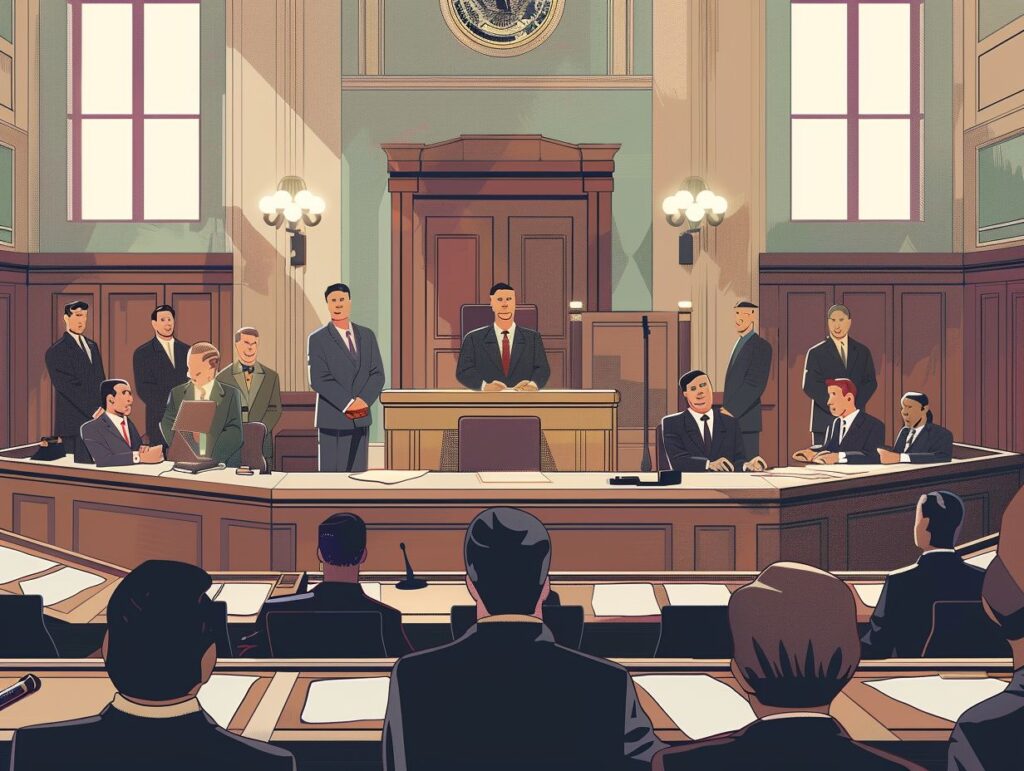Discovery is a vital component of the litigation process in Florida, allowing parties to obtain essential information and evidence from each other.
We will explore the different types of discovery methods, including interrogatories, depositions, requests for production, and requests for admission.
Discover how discovery is used in Florida litigation, the rules and procedures governing discovery, and the benefits it offers, such as avoiding trial surprises and encouraging settlements.
Stay tuned to learn more about the role of discovery in Florida litigation.
Key Takeaways:

- Discovery is a crucial step in Florida litigation, allowing parties to gather evidence, evaluate strengths and weaknesses, and prepare for trial.
- Interrogatories, depositions, requests for production, and requests for admission are the four main types of discovery used in Florida litigation.
- Following the rules and procedures for discovery, including timing and deadlines, objections, and motions to compel, is essential for a successful case.
What is Discovery in Florida Litigation?
The discovery phase is an important part of Florida litigation, where parties involved in a lawsuit share information and evidence to support their cases. This process is mainly governed by the Florida Rule Civil Procedure 1.280.
During discovery, each party gains a comprehensive understanding of the facts, evidence, and arguments put forth by the opposing party. Through this exchange, both sides can request documents, pose questions, and depose witnesses to gather crucial information that strengthens their claims or defenses. Discovery promotes transparency, helps to focus on the issues in dispute, eases settlement discussions, and ensures a fair trial based on all relevant evidence.
What are the Different Types of Discovery?
In Florida litigation, different discovery mechanisms such as interrogatories, depositions, requests for production, and requests for admission are utilized to ensure adherence to the court’s requirements and important provisions.
1. Interrogatories
Interrogatories are a type of discovery where one party sends written questions to another party to collect detailed information relevant to the lawsuit. This process is critical in the litigation process as it enables parties to acquire necessary information from each other to construct their cases effectively.
By necessitating precise and comprehensive responses, interrogatories help in clarifying facts, identifying key issues, and narrowing the scope of the dispute. Through these written questions, parties can delve into the specifics of the case, potentially uncovering essential evidence that may impact the lawsuit’s outcome.
Therefore, providing accurate and thorough responses to interrogatories is essential in ensuring a fair and transparent legal process.
2. Depositions
Depositions involve the process of obtaining sworn testimony from a witness or party outside of court. This testimony is typically recorded by a court reporter and may also be videotaped for potential use in trial strategy.
The deposition process is integral to case preparation as it enables attorneys to gather information, evaluate witness credibility, and anticipate possible arguments. By obtaining sworn statements from key individuals, lawyers can assess the strengths and weaknesses of their case and that of the opposing party.
The court reporter’s meticulous recording of all spoken words ensures an accurate record of the proceedings, while videotaping adds a visual component that can be influential during trial presentations. These depositions offer valuable insights that can influence the course of a case and assist attorneys in crafting effective trial strategies.
3. Requests for Production
Requests for production involve one party asking another to provide specific documents or tangible evidence relevant to the case, ensuring compliance with discovery rules in civil litigation.
Thorough documentation of requested materials is crucial for both the party making the request and the party producing the documents. Proper documentation serves as a record of what was requested, what was produced, and the timeline of the exchange. By maintaining comprehensive records, both parties can ensure transparency and accountability throughout the discovery process.
Compliance tips for requesting parties include being specific in the documents requested, avoiding overly broad or burdensome requests. On the other hand, producing parties should carefully review each request, seek clarification if needed, and ensure that only relevant and responsive materials are provided.
4. Requests for Admission

Requests for admission serve as a method to request a party to admit or deny specific facts, which helps simplify the evidence-gathering process and streamline later stages of the lawsuit.
These requests are essential in clarifying contentious issues early in the litigation process. By admitting certain facts, parties can avoid unnecessary disagreements, focus on genuine points of contention, and potentially facilitate quicker settlements.
Failure to respond appropriately or truthfully to these admissions can result in significant consequences. If a party fails to provide a proper response, they may encounter adverse inferences, credibility challenges, or even formal sanctions from the court. These outcomes can lead to delays, increased expenses, and negative impacts on the overall case strategy.
How is Discovery Used in Florida Litigation?
The discovery process in Florida litigation is systematically utilized to gather evidence, assess the strengths and weaknesses of a civil lawsuit, and prepare for trial.
1. Gathering Evidence
Collecting evidence through the discovery process is vital for constructing a robust case, particularly in personal injury cases that rely heavily on detailed factual information and documentation.
By utilizing techniques like interrogatories, depositions, requests for production, and requests for admission, attorneys can acquire a diverse range of evidence to bolster their arguments. This approach permits involved parties to exchange relevant information, promoting transparency and equity in the legal process.
Adhering to civil procedure rules and employing strategies tailored to personal injury cases can effectively streamline the evidence-gathering process. These thorough evidentiary materials form the basis for presenting a compelling case and enhancing the likelihood of a favorable outcome in litigation.
2. Evaluating Strengths and Weaknesses
Assessing strengths and weaknesses in the discovery process enables attorneys to create a sound trial strategy and provide accurate advice to clients, enhancing the attorney-client relationship.
By conducting a comprehensive review of the evidence and information revealed during discovery, lawyers can evaluate the strengths of their case and anticipate potential challenges that may arise.
This insight aids in developing a robust legal strategy and facilitates transparent communication with clients regarding the risks and opportunities involved. The identification of crucial facts through the discovery process equips attorneys with the tools needed to navigate intricate legal issues and make informed decisions in the clients’ best interests.
3. Preparing for Trial
Preparing for trial involves using information obtained during discovery to develop a solid trial strategy, ensuring adherence to discovery rules and effectively representing the client in court.
One crucial step that attorneys take in preparing for trial is analyzing the evidence gathered during discovery to pinpoint strengths and weaknesses in the case. Through careful examination of documents, witness statements, and other relevant information, attorneys can construct compelling arguments and anticipate potential challenges that may arise during trial.
Attorneys often participate in mock trial exercises to assess their arguments and witness testimony, ensuring they are well-equipped for any scenario that may unfold in the courtroom. This detailed and strategic planning is essential in constructing a strong case and advocating effectively for their clients.
What are the Rules and Procedures for Discovery in Florida Litigation?
The guidelines and processes for discovery in Florida litigation, as detailed in Florida Rule Civil Procedure 1.280, aim to guarantee adherence to discovery regulations, establish deadlines, and handle objections and motions to compel.
1. Timing and Deadlines

The timing and deadlines for discovery in Florida litigation are crucial for ensuring a smooth progression through the stages of the lawsuit and for complying with procedural rules.
Adhering to discovery timelines, which include initial deadlines and ongoing obligations, is essential for the efficiency and effectiveness of the legal process. Meeting these deadlines enables the timely exchange of information between parties, facilitating the development of legal strategies and case preparation.
Failure to adhere to discovery timelines can result in sanctions, procedural delays, and potential negative impacts on the case outcome. Therefore, maintaining organization, being proactive, and keeping track of these deadlines are essential for successfully navigating the complexities of litigation.
2. Objections and Motions to Compel
Objections and motions to compel are commonly used tools to address disputes in the discovery process, often involving considerations of compliance and attorney-client privilege.
When parties encounter objections during the discovery process, it is essential for them to grasp the reasons behind these objections. This knowledge enables them to evaluate the objections’ legitimacy and determine the subsequent actions to take.
If a party suspects that specific information is being unjustly withheld, they have the option to file a motion to compel, requesting the court to enforce discovery requests. It is crucial to adhere to the precise procedures outlined by the court to ensure that all submissions align with the regulations governing discovery.
Parties must remain cautious in safeguarding privileged information during this process, as inadvertent disclosure of such information could lead to severe repercussions for the case.
What are the Benefits of Discovery in Florida Litigation?
The advantages of the discovery process in Florida litigation include:
- Preventing surprises at trial
- Promoting settlements
- Preserving testimony
All of these aspects enhance a more efficient civil litigation strategy.
1. Avoiding Surprises at Trial
The discovery process offers a significant benefit by helping both parties avoid surprises at trial. It enables them to understand the evidence and arguments that will be presented.
Various discovery mechanisms, including depositions, interrogatories, requests for documents, and expert testimonies, allow legal teams to thoroughly investigate the facts of the case. Depositions permit attorneys to question witnesses under oath, revealing important details that may not have been initially clear.
Interrogatories facilitate the exchange of written questions and answers between parties, providing insight into each side’s position. Requests for documents aid in collecting tangible evidence, while expert testimonies offer specialized knowledge. Utilizing these tools aids attorneys in developing a strong case strategy, minimizing the chances of unexpected revelations during the trial.
2. Encouraging Settlement
The discovery process facilitates settlement and compromise by elucidating the strengths and weaknesses of each party’s case, simplifying the process of reaching a mutually agreeable resolution.
This process encompasses the sharing of information and evidence among the parties engaged in a legal dispute, enabling them to comprehend the merits and risks associated with their claims or defenses.
Through the revelation of crucial facts, documents, and testimonies, discovery aids both sides in evaluating the probability of success in court and the prospective results of ongoing litigation. This transparency frequently initiates conversations regarding potential settlements as parties recognize the advantages of circumventing expensive and protracted trials.
3. Preserving Testimony
Preserving testimony through depositions and other discovery methods ensures that witness statements are recorded and can be used effectively in trial strategy.
By meticulously capturing the details of a witness’s account, depositions provide a crucial record that can be referred back to during a trial. This aids in refreshing memories, verifying facts, and challenging inconsistencies that may arise during the legal proceedings.
Other discovery tools like requests for production of documents help gather evidence necessary for building a strong case. The preservation of testimonies through these methods not only safeguards the integrity of the legal process but also plays a vital role in ensuring a fair and just trial.
Frequently Asked Questions

What is the role of discovery in Florida litigation?
The role of discovery in Florida litigation is to allow both parties involved in a legal dispute to gather information and evidence from each other. This process helps ensure that all relevant facts are brought to light and a fair decision can be reached.
What types of discovery are commonly used in Florida litigation?
The most common types of discovery used in Florida litigation include interrogatories (written questions), requests for production of documents, requests for admission, and depositions (oral testimony under oath).
Who can request discovery in Florida litigation?
Both parties involved in a legal dispute have the right to request discovery in Florida litigation. This includes the plaintiff and the defendant, as well as any other parties involved in the case.
What is the purpose of a deposition in Florida litigation?
A deposition serves as a way for attorneys to gather testimony and evidence from witnesses or parties involved in a legal dispute. This can help shape the case and provide valuable information for both sides.
Are there any limitations to the use of discovery in Florida litigation?
Yes, there are limitations on the use of discovery in Florida litigation. For example, the requested information must be relevant to the case, and there are certain privileges that protect certain types of information from being disclosed.
What role does the court play in the discovery process in Florida litigation?
The court oversees the discovery process in Florida litigation and can intervene if a party fails to comply with a discovery request or if there are any disputes about the scope or relevance of the requested information.























Rate this article:
Average rating 4 / 5. Vote count: 1
No votes so far! Be the first to rate this post.
No Comments yet!